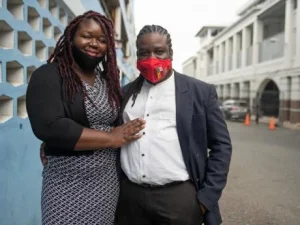Jamaica: Landmark Decision Upholds Rights of Dreadlocked student
In a landmark ruling on July 18, 2024, the Court of Appeal in Jamaica declared that Kensington Primary School had violated the constitutional rights of a girl child by refusing her admission over the dreadlocked hairstyle.
19th of July 2024

In a landmark ruling on July 18, 2024, the Court of Appeal in Jamaica declared that Kensington Primary School had violated the constitutional rights of a girl child by refusing her admission over the dreadlocked hairstyle.
The pronouncement by outgoing president Justice Patrick Brooks said the school’s policy was not only in conflict with the child’s right to freedom of expression but also violated equitable treatment by a public authority. The case came after the school denied admission to the student on grounds of hygiene and other infectivity concerns related to the dreadlocks.
Although the school fought for its claims backed by reports, in the form of submissions of risks of lice and mold problems due to dreadlocks, the parents, Dale and Sherine Virgo, did not change their minds about cutting their daughters’ hair and decided to sue the school’s board, Ministry of Education, and Attorney General.
A 2020 Supreme Court ruling had previously sided with the school, stating that there had been no breach of the constitutional rights. This week’s decision by the Court of Appeal overturned elements of the earlier ruling and upheld the position that the grooming policy of the school was indeed unconstitutional.
Justices Sonia Bertram-Linton, Evan Brown, and Nicole Simmons said the child’s right to self-expression needed to be acknowledged and fell more in the area of personal identity than religious expression.

Attorney-at-law Isat Buchanan, who represented the Virgos, hailed the ruling as a victory for human rights in Jamaica, particularly in regard to Afro identity and other minority groups. He hailed the ruling as an important step toward respecting freedom of expression across private and governmental entities.
This legal battle has been one step toward addressing issues of racial discrimination and discrimination of cultural identity within Jamaica, but it also spurred discussions on general human rights. Rulings in this case may become influential policy on personal expression in the future, both within schools and public places.
Hylton and Daynia Allen, King’s Counsel attorneys for the appellants, replied to the decision, with the school board and the Ministry of Education being represented by KC Althea Jarrett and counsel Jevaughnia Clarke.
The ruling is an important milestone in Jamaican jurisprudence with the entrenchment of protection of the rights of the individual against a background of cultural diversity and asserting the principle of equality before the law.
Latest
- US withdraws advisory on St. Kitts and Nevis, gives green flag to its Citizenship Programme
-
CARIFTA Games 2026 set to take place in Grenada from April 4-6 -
West Indies Women’s Cricket team announced for T20 series against Sri Lanka in Grenada -
Man arrested in connection with murder of 14-year-old girl in Essequibo Coast -
Randy Baltimore nominated for St Philip’s North By-Election after Yearwood resignation
Related Articles

22nd of November 2024




3rd of April 2024


2nd of April 2024

